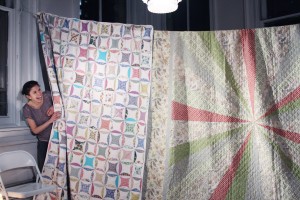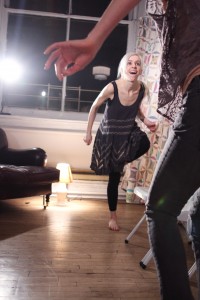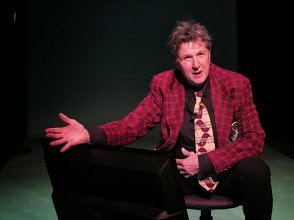What is an American? As children of immigrants, who are we really? And where are we from? Some ancestral homeland or from wherever we were raised? Questions such as these are at the heart of East Towards Home, written by Billy Yalowitz and directed by David Schechter, which recently ended its run at the Theater for the New City. At its best, this show is charming and relatable. At its worst, however, this show is nothing more than self-indulgent. This uneven play presents wonderful musical interludes, but the plot leaves much to be desired.
The story centers around a young man, played by David Kremenitzer, ostensibly our narrator/playwright Yalowitz at a younger age, trying to find his place in folk music and socialist revolution. In order to do so, we all travel back in time to meet him as a small boy, learning to play in his multi-racial neighborhood. We journey with him through the trials and tribulations of childhood, such as baseball tryouts, bullying, summer camp and annoying old neighbors. One such neighbor, Sylvie, portrayed by Eleanor Reissa, proves to be an essential cog in the story; she knew the young man's musical hero, Woody Guthrie, and participated directly in early to mid-twentieth century Communism in America.
When the show focuses on these satellite narrative threads, it is at its best. Sylvie’s story sheds light on a moment in our history often overlooked, bringing out the beauty of Yiddish speech and traditional dance. The highlight of the show comes in the fourth performer — Brian Gunter’s performing of folk music as Woody Guthrie. He is an extremely skilled musician, who brings to life both the sounds and meanings of this music style. The play consists of three interlocking narratives; these two and the play's driving narrative arc. Although this is meant to show the links between Guthrie, Sylvie, and our protagonist, it is often disorienting and left me wondering in which story we find ourselves at any given moment.
The tale of the young man, however, often falls flat. Despite wanting to sympathize with him, I found myself wondering why he felt so lost. He seemed to have a great understanding of the world and to have been given some incredible opportunities. Yes, he was a victim of discrimination, anti-Semitism, and political oppression, which are no small matters, but he seemed to have the wherewithal to overcome it. By including himself as an older man as a character, it was always clear he had found his way home. It also made it seem like this production was somewhat of a celebration of itself. He had overcome and lived to make a play of it.
All in all, the notion of a lost young person trying to find his place in the world does seem universal. The music is wonderful and the use of projections and direct audience address work nicely to engage the spectators in active thought about the issues presented. Unfortunately, the takeaway is diminished by the story being too specific. Ultimately, this is not a play about us, the people bearing witness. It is an individual recitation, meant to show us who this particular person is, not what might be possible if we work together.





















